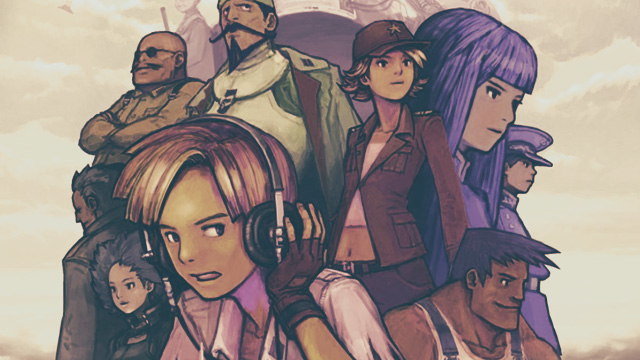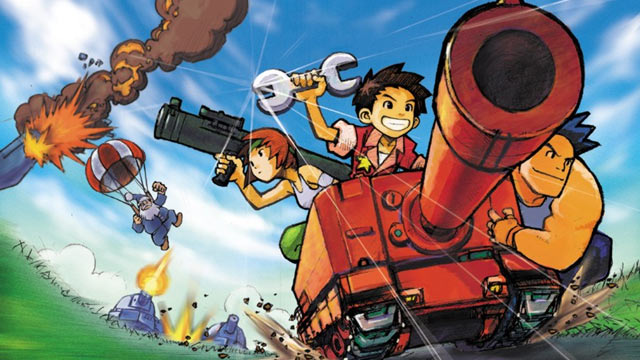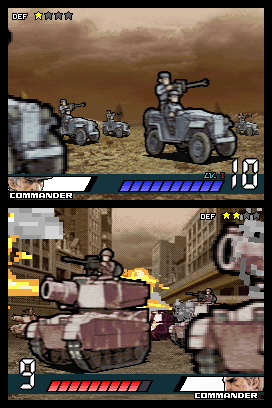 War isn’t any fun in real life, but on Nintendo systems, true Power Players know that war can be one of the best time-wasters on the planet. The Wars series is one of Nintendo’s second-tier franchises, and has been around a long time, but never seems to get the recognition of more popular properties like Metroid or the Legend of Zelda. But why is that exactly?
War isn’t any fun in real life, but on Nintendo systems, true Power Players know that war can be one of the best time-wasters on the planet. The Wars series is one of Nintendo’s second-tier franchises, and has been around a long time, but never seems to get the recognition of more popular properties like Metroid or the Legend of Zelda. But why is that exactly?
At least one Wars game has practically been on every Nintendo system out there– the exceptions are Virtual Boy and N64– since the Famicom. With that kind of representation– after all, Metroid wasn’t on either of those systems, either– it’s amazing that the Wars games have not become one of Nintendo’s most renowned franchises worldwide. The series has got rock-solid gameplay and is made by one of Nintendo’s top-tier in-house development teams, Intelligent Systems. What’s the deal with that? Well, there are a few different reasons for the discrepancy.
Most importantly, even though there were a lot of Wars entries on the older Nintendo systems, none of these entries made it to America or Europe. So effectively over half of the potential audience was cut out from the beginning. The series did respectably well in its homeland, enough so that there were six entries total on the Famicom, Super Famicom, and Game Boy systems. But with no Western presence, it’s understandable how the series might not have caught fire to the extent that say, Mario has.

Western gamers first saw these little guys on the GBA.
Then, in 2001, Advance Wars came out. In addition to being one of the more interesting entries in the franchise, it also happened to come out on September 12, 2001. Probably it’s obvious what else was going on then. Due to this coincidence, Nintendo pulled the release from Japanese and European shelves. Despite this, the game went on to impressive success in America (it had not previously even been considered for release outside Japan until people at Nintendo of America played it and thought it was fantastic). Impressive enough that it went on to produce its own sub-series of Wars games (these being Advance Wars, Advance Wars 2: Black Hole Rising, Advance Wars: Dual Strike, and Advance Wars: Days of Ruin), and also is uniquely responsible for the GBA Fire Emblem being released in the West, as well.
Now, while these two Game Boy Advance games were doing just fabulously in America and later, in Europe, in Japan they weren’t even released until 2004, as part of the Game Boy Wars Advance 1+2 compilation. It’s understandable how those three extra years might have dampened the enthusiasm for the series in its home country. On the other hand, Advance Wars: Dual Strike (called Famicom Wars DS in Japan) was released nearly simultaneously in all regions, and garnered universal praise. This would prove to be the exception, however.
 The next DS installment, Advance Wars: Days of Ruin (called Dark Conflict in Europe, this matters) was released in America and Europe separately, with completely different translations. Meaning, each region has different names for characters, regions, and slightly different translations, despite the same basic story being the same. This could cause some confusion, and as it turned out, the Japanese release was canceled altogether. The Japanese version of the game is accessible via the American DS Game Card, which includes the entire Japanese script, albeit only with a GameShark or similar accessory. Clearly, not enough to warrant a mass importing of the game to Japan.
The next DS installment, Advance Wars: Days of Ruin (called Dark Conflict in Europe, this matters) was released in America and Europe separately, with completely different translations. Meaning, each region has different names for characters, regions, and slightly different translations, despite the same basic story being the same. This could cause some confusion, and as it turned out, the Japanese release was canceled altogether. The Japanese version of the game is accessible via the American DS Game Card, which includes the entire Japanese script, albeit only with a GameShark or similar accessory. Clearly, not enough to warrant a mass importing of the game to Japan.
Then, there are the Battalion Wars sub-series of games. While these have almost no relation to the turn-based tactics of the mainline Wars series, they do feature similar units and have been critically well-regarded. However, Japan regards them primarily as an offshoot of the main series, where the games are known as Totsugeki!! Famicom Wars.
So, basically, the first half of the Wars series was released in only one market, while the Advance sub-series is immensely popular in America and nowhere else, and yet another sub-series is not considered to be truly part of the main series in Japan. It seems as if there is major confusion on the part of the gaming public in general on the status of the Wars series, which would seem to explain why the franchise has never achieved top-tier status in any territory. Hopefully, future releases can change this sad fact.




 ShareThis
ShareThis







I really enjoyed Advance Wars: Days of Ruin, despite what seemed like clear pandering to a Western audience there– though I didn’t realize the European release had a different translation. I wonder if the stories are different too, rather than just their execution.
I don’t think that there is that much difference, mostly the names of stuff.